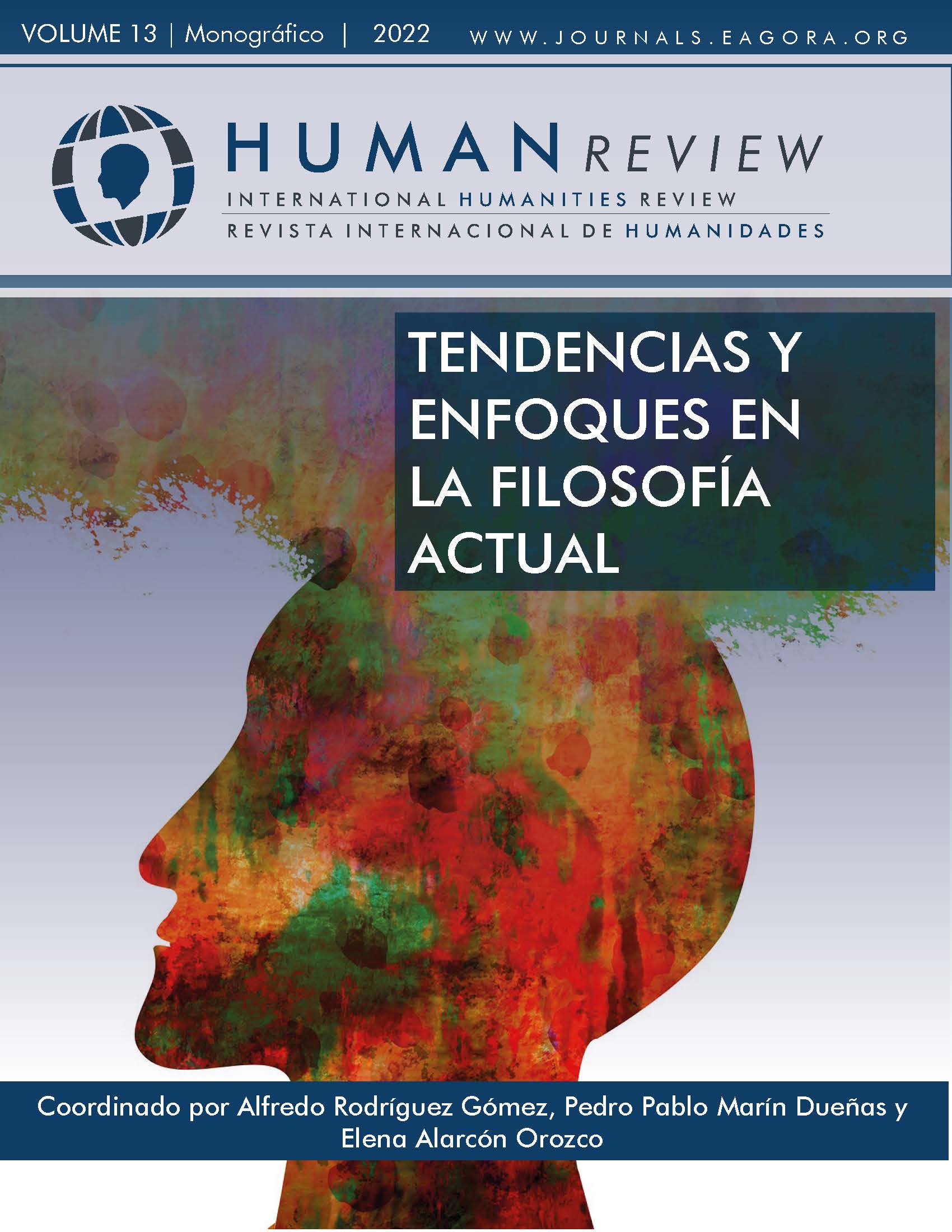The Theory de La problematologie and hermeneutics
Towards an argumentative horizon to free interpretation from propositional tyranny
DOI:
https://doi.org/10.37467/revhuman.v11.4069Keywords:
Argumentation, Questioning, Hermeneutics, Rationality, Meaning, Interpretative tyranny, ProblematologyAbstract
The problematic theory of the Belgian philosopher Michel Meyer opened a new philosophical and argumentative horizon to free human thought from the dominance of the propositional tendency. A tendency that imposed a systematic pattern, throughout the history of human thought, with a logical reference based on the principles of non-contradiction, identity and excluded third party. This article will focus on the contributions of the so-called “de la problematologie” theory to free interpretation from the propositional tyranny that reduces the plurality of answers to a propositional dichotomy A or -A .
References
Al Mutawakkil, Ahmed. (2003). Réflexions sur la théorie de la signification dans la pensée linguistique arabe. Publications de la Faculté des Lettres de Rabat.
Alain Rabatel, (2018). Michel Meyer, Qu’est-ce que le questionnement? Questions de communication, 33, 434-437.
Arrien, S. J. (2014). L’inquiétude de la pensée. L’herméneutique de la vie du jeune Heidegger (1919-1923). Notes, 29(30), 31.
Baker, G., & Hacker, P. M. S. (1991). Wittgenstein: Rules, Grammar and Necessity. An Analytical Commentary on the Philosophical Investigations. Vol.2. Wiley-Blackwell.
Baldwin, T. (1997). Frege, Moore, Davidson: the indefinability of truth. Philosophical Topics, 25(2), 1-18.
Beaney, M. A. (2014). Gottlob Frege. In Oxford Bibliographies. Oxford University Press.
Berner, C. (1995). La philosophie de Schleiermacher: herméneutique, dialectique, éthique. Cerf.
Bianchi, L. (2002). Interpréter Aristote par Aristote. Parcours de l’herméneutique philosophique à la Renaissance. Methodos. Savoirs et textes, 2, 267-288.
Benmakhlouf, A. (1996). Bertrand Russell. La Philosophie de l’atomisme logique. PUF.
Carrilho, M. (1992). Rhétoriques de la modernité. Presses Universitaries de France.
Cassin, B. (1997). Aristote et le logos. PUF.
Cossutta, F. (1996). Descartes et l’argumentation philosophique. PUF.
Damour, T. (2001). Questioning the equivalence principle. Comptes Rendus de l’Académie des Sciences-Series IV-Physics, 2(9), 1249-1256.
De Chanay, H., Colas-Blaise, M., & Le Guern, O. (2013). Dire, montrer: au coeur du sens. Université de Savoie.
Dorion, L. A. (1995). Les réfutations sophistiques. Vol. 18. Vrin.
Eijck, J. V. (2005). Natural logic for natural language. In International Tbilisi symposium on logic, language, and computation (pp. 216-230). Springer.
Engel, P. (2020). La dispute: une introduction à la philosophie analytique. Minuit.
Gadamer, H. G. (1969). Schleiermacher platonicien. Archives de Philosophie, 32(1), 28-39.
Gouhier, H. (1987). La pensée métaphysique de Descartes. Vrin.
Grondin, J. (2022). L’herméneutique. Que sais-je? PUF.
Hadot, P. (2004). Wittgenstein et les limites du langage.
Hintikka, J. (1989). The role of logic in argumentation. The Monist, 72(1), 3-24.
Hoogaert, C. (1996). Argumentation et questionnement. FeniXX.
Ibn rúshd (Averroes). (1980). Taljis Kitáb Aristotális Fi Al Íbarah. Al-Hay (r) Ah Al-Miosraiyah Al-Aammah Lil-Kitaab.
Jebri, I. (2020). Pathos o el poder de la imagen en Michel Meyer. Revista Jitábát. nº 2 . (pp. 281-291) (en árabe ).
Kamp, H., & Reyle, U. (2013). From discourse to logic: Introduction to modeltheoretic semantics of natural language, formal logic and discourse representation theory. Vol. 42. Springer Science & Business Media.
Lumer, C. (1991). Structure and function of argumentations. An epistemological approach to determining criteria for the validity and adequacy of argumentations. In Proceedings of the Second International Conference on Argumentation. Vol. 1 (pp. 98-107). Sicsat.
McCoy, M. (2007). Plato on the Rhetoric of Philosophers and Sophists. CUP.
Meyer, M. (1986). Pour une anthropologie rhétorique. En M. Meyer (Ed.), De la métaphysique à la rhétorique (pp. 119-142). Editions de l’Université de Bruxelles.
Meyer, M. (1993). Questions de rhétorique. Le Livre de Poche, Biblio-Essais.
Meyer, M. (2005). Qu’est-ce que l’argumentation? Librairie philosophique.
Meyer, M. (2008). De la problématologie: philosophie, science et langage. Presses Universitaires de France.
Meyer, M. (2017). Qu’est-ce que le questionnement? Vrin.
Morris, M. (2008). Routledge Philosophy Guidebook to Wittgenstein and the Tractatus. Routledge.
Nietzsche, F. (2017). The will to power. Penguin.
Perelman, C., & Olbrechts-Tyteca, L. (1989). Tratado de la argumentación.
Peters, S., & Westerståhl, D. (2006). Quantifiers in language and logic. OUP.
Platón (2022). Phaedrus. DigiCat.
Ricoeur, P. (1986). Rhétorique–Poésie–Herméneutique. En M. Meyer (Ed.), De la métaphysique à la rhétorique (pp. 143-155). Editions de l’Université de Bruxelles.
Ricoeur, P. (2008). Hermenéutica y acción. De la hermenéutica del texto a la hermenéutica de la acción. Prometeo Libros Editorial.
Taha, A. (2020). Pluralism of Values: Its Scope and Limitations. ICR Journal, 1(1). https://doi.org/10.52282/icr.v1i1.1
Textor, M. (Ed.). (2013). Judgement and truth in early analytic philosophy and phenomenology. Springer.
Van Benthem, J. (2007). Logic in philosophy. En Philosophy of logic (pp. 65-99). North-Holland.
Wittgenstein, L. (2013). Tractatus logico-philosophicus. Routledge.
Woerther, F. (2006). Rhétorique, dialectique et sophistique: Aristote, Rhétorique, I, 1, 1355 b 14-21. Mélanges de l’Université Saint Joseph, (59), 13-28.
Downloads
Published
How to Cite
Issue
Section
License
Those authors who publish in this journal accept the following terms:
- Authors will keep the moral right of the work and they will transfer the commercial rights.
- After 1 year from publication, the work shall thereafter be open access online on our website, but will retain copyright.
- In the event that the authors wish to assign an Creative Commons (CC) license, they may request it by writing to publishing@eagora.org









